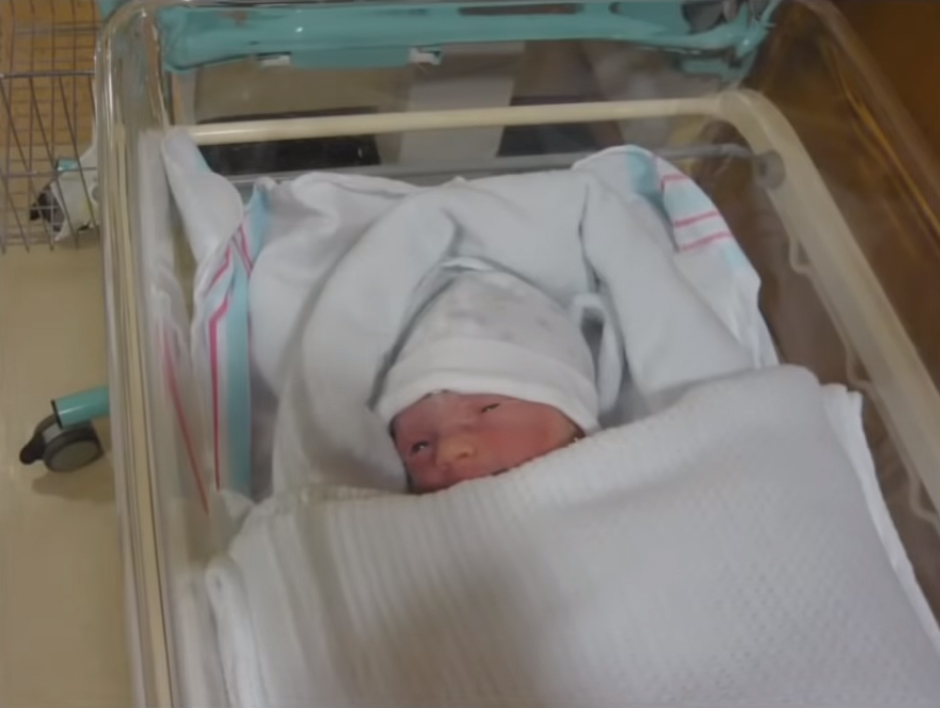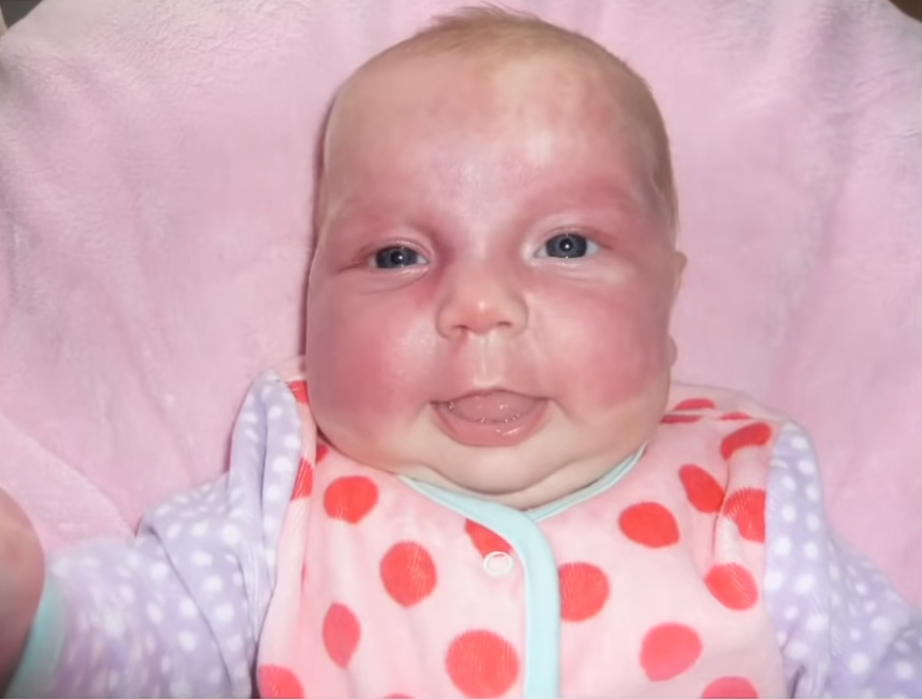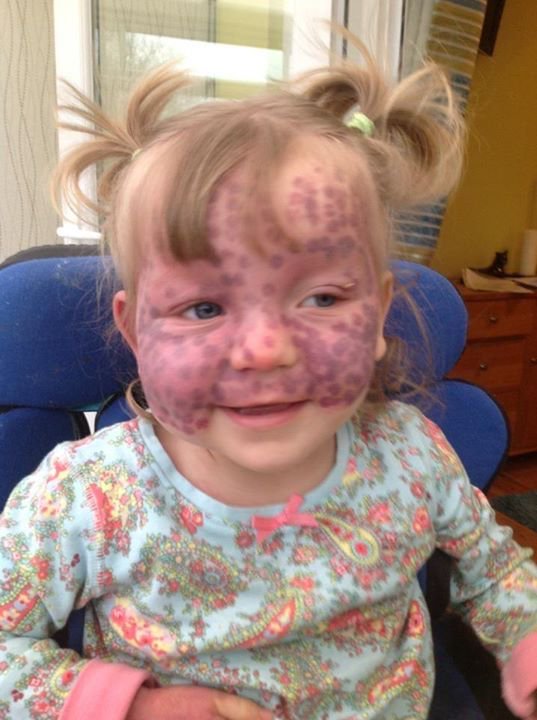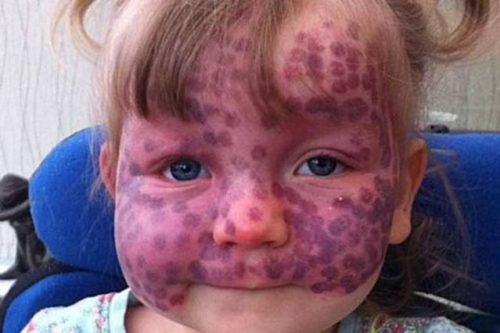For many families, the joy of welcoming a new baby is filled with dreams of milestones, laughter, and cherished moments. But for the Callaghans, the arrival of their daughter Matilda Rose brought both love and an unexpected journey filled with challenges, strength, and unwavering resilience. Their story is one of devotion, perseverance, and the constant battle against hurtful judgments from strangers who fail to see beyond appearances.

A Difficult Beginning
From the start, Matilda’s life was marked by struggles. Complications during pregnancy meant that her arrival came sooner than expected. Doctors and parents alike were uncertain of the full extent of her health issues until the day she was born. When she entered the world, her tiny face was covered with dark blue and red marks. At first, medical staff believed they were simply bruises from birth, but further examinations revealed something far more complex.
In her earliest days, Matilda endured countless medical interventions. She had to undergo delicate surgeries, and on two occasions she stopped breathing, only to be revived by doctors who refused to give up on her fragile life. It was later discovered that she suffered from Trachea Oesophageal Fistula (TOF) as well as Sturge-Weber Syndrome, a rare neurological disorder that results in port-wine stains across the skin. For Matilda, those marks appeared across her face, forehead, and around her eyes, signaling the beginning of a lifelong medical journey.
The Reality of Sturge-Weber Syndrome
Sturge-Weber Syndrome is not merely a cosmetic issue. It is a complex condition that can affect neurological development and vision, and it requires ongoing care. In Matilda’s case, doctors quickly realized that in order to prevent her birthmarks from spreading and impacting her brain or internal organs, laser treatments would be necessary. These treatments, though essential, leave her skin covered in temporary polka-dot marks that take weeks to fade. Since the procedures must be repeated every two months, her face often carries these visible reminders of her condition.
For her parents, the treatments are a painful but vital part of protecting their daughter’s health. They know that without them, the risks to her future would be far greater. Yet, for many strangers, what they see is not a medical necessity but something they misinterpret in the most hurtful of ways.

Misunderstandings in Public
Whenever the family goes out together, they are met with stares, whispers, and sometimes outright accusations. Many people assume that the marks covering Matilda’s face are signs of abuse, believing she has been beaten rather than treated for her condition. These assumptions not only hurt her parents deeply but also expose the painful reality of how quick society can be to judge based on appearances.
The Callaghans have spoken openly about these encounters. They describe how heartbreaking it feels to watch strangers mock their daughter or jump to cruel conclusions. To them, Matilda is not defined by the marks on her face. She is their brave, beautiful little girl who has endured more in her young life than many adults face in a lifetime.
Matilda’s father has expressed his frustration, saying he wishes people would look beyond the birthmarks and see the joyful, loving child behind them. His hope is that by sharing her story, others might pause before making assumptions and instead learn to approach differences with kindness and compassion.
Challenges Beyond the Skin
Matilda’s journey is not limited to her visible condition. She also faces significant developmental challenges. She is unable to walk independently and struggles with communication, making daily life more complex for both her and her family. Despite these difficulties, her parents work tirelessly to give her the best life possible. They surround her with love, encouragement, and support, determined to ensure that she knows she is cherished exactly as she is.
Their greatest fear, however, is how society’s reaction to her appearance might affect her self-confidence as she grows older. Right now, Matilda is too young to fully understand the way others view her. But her parents worry that, in time, the cruel stares and comments could weigh heavily on her spirit. That is why they continue to advocate for her, hoping to create a world where she is accepted and celebrated, not ridiculed.

A Call for Compassion
The story of the Callaghans and their daughter is more than just one family’s battle. It is a reminder of the importance of empathy in a world where differences are often met with suspicion or cruelty. Rare conditions like Sturge-Weber Syndrome are not well understood by the general public, which is why education and awareness are so crucial. By talking openly about their daughter’s journey, Matilda’s parents are helping others recognize the need for compassion over judgment.
Every time a stranger makes a hurtful assumption, they not only wound the family but also highlight a broader issue: society’s tendency to fear or dismiss what it doesn’t understand. Yet, through their courage in sharing their daughter’s experiences, the Callaghans are working to shift that perspective. They want others to realize that behind every visible difference is a person deserving of dignity, kindness, and love.
A Story of Strength and Love
At the heart of this journey is a little girl who continues to fight against the odds. Matilda has survived life-threatening moments, undergone countless procedures, and endured the ongoing challenges of a rare condition. But she does not face it alone. Her parents’ unwavering love gives her the strength to continue, and their determination ensures she has every chance at a fulfilling life.
Her story also highlights the resilience of children living with rare disorders. Despite physical struggles and social challenges, they bring light, joy, and inspiration to the lives of those around them. Matilda’s smile, her spirit, and her courage shine brighter than any mark on her skin.

Looking Forward
The Callaghans know that their journey is far from over. The treatments will continue, the challenges will evolve, and the misunderstandings from strangers may persist. But they are committed to standing beside their daughter every step of the way. To them, she is not defined by her condition but by her heart, her strength, and the love she shares with those closest to her.
By telling her story, they hope to change the way people view children like Matilda. They want the world to understand that every mark, every struggle, and every challenge is part of a much larger picture—one that shows resilience, hope, and the power of unconditional love.
Final Thoughts
Parents of children with rare medical conditions carry not only the burden of care but also the emotional weight of public misunderstanding. The Callaghans’ story is a powerful example of what it means to love fiercely in the face of adversity. Their plea to the world is simple: look beyond the surface, see the person, and choose kindness over judgment.
Matilda Rose is more than her condition. She is a reminder that true beauty lies not in outward appearances but in the courage to face life’s challenges with grace and love. And thanks to her devoted parents, she will always have the strength to continue her fight, no matter how many obstacles stand in her way.
